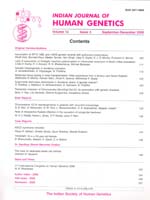
|
Indian Journal of Human Genetics
Medknow Publications on behalf of Indian Society of Human Genetics
ISSN: 0971-6866
EISSN: 0971-6866
Vol. 17, No. s1, 2011, pp. 27-31
|
 Bioline Code: hg11060
Bioline Code: hg11060
Full paper language: English
Document type: Research Article
Document available free of charge
|
|
|
Indian Journal of Human Genetics, Vol. 17, No. s1, 2011, pp. 27-31
| en |
Power comparison between population-based case-control studies and family-based transmission-disequilibrium tests: An empirical study
Haldar, Tanushree. & Ghosh, Saurabh.
Abstract
Background: There are two major classes of genetic association analyses: population based and family based. Population-based case-control studies have been the method of choice due to the ease of data collection. However, population stratification is one of the major limitations of case-control studies, while family-based studies are protected against stratification. In this study, we carry out extensive simulations under different disease models (both Mendelian as well as complex) to evaluate the relative powers of the two approaches in detecting association.
Materials and Methods: The power comparisons are based on a case-control design comprising 200 cases and 200 controls versus a Transmission Disequilibrium Test (TDT) or Pedigree Disequilibrium Test (PDT) design with 200 informative trios. We perform the allele-level test for case-control studies, which is based on the difference of allele frequencies at a single nucleotide polymorphism (SNP) between unrelated cases and controls. The TDT and the PDT are based on preferential allelic transmissions at a SNP from heterozygous parents to the affected offspring. We considered five disease modes of inheritance: (i) recessive with complete penetrance (ii) dominant with complete penetrance and (iii), (iv) and (v) complex diseases with varying levels of penetrances and phenocopies.
Results: We find that while the TDT/PDT design with 200 informative trios is in general more powerful than a case-control design with 200 cases and 200 controls (except when the heterozygosity at the marker locus is high), it may be necessary to sample a very large number of trios to obtain the requisite number of informative families.
Conclusion: The current study provides insights into power comparisons between population-based and family-based association studies.
Keywords
Allelic association, informative trios, complex genetic disorder
|
| |
© Copyright 2011 Indian Journal of Human Genetics.
Alternative site location: http://www.ijhg.com/
|
|
